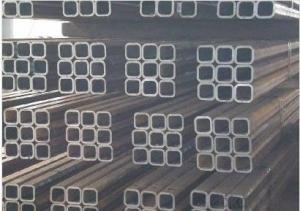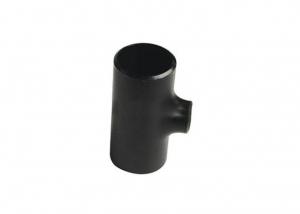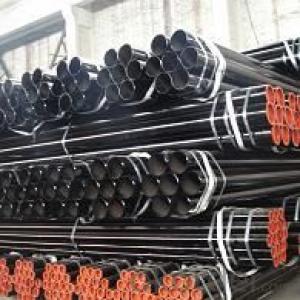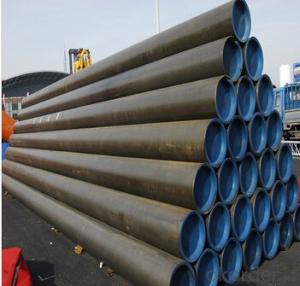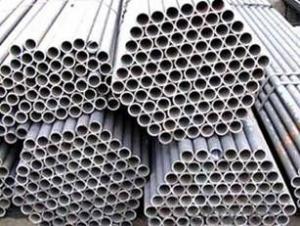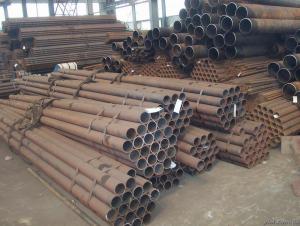CARBON STEEL PIPE SEAMLESS PIPE
- Loading Port:
- China Main Port
- Payment Terms:
- TT OR LC
- Min Order Qty:
- -
- Supply Capability:
- -
OKorder Service Pledge
OKorder Financial Service
You Might Also Like
Standard: API 5L, API 5CT, ASTM A106/A53, ASTM A519, JIS G 3441, JIS G3444, JIS G3445 DIN 2391, EN10305, EN10210, ASME SA106, SA192, SA210, SA213, SA335, DIN17175, ASTM A179…
Out Diameter: 1/8 – 30 inch (10.3-762mm)
Wall Thickness: 0.049” – 2.5” (1.24- 63.5mm)
Length: Random Length, Fixed Length, SRL, DRL
Steel Grade:
API 5L: GR B, X42, X46, X56, X60, X65, X70
ASTM A53/A106: GR A, GR B, GR C
ASME SA106: GR.A, GR.B, GR.C
ASME SA192: SA192
ASME SA209M: T1, T1a
ASME SA210: GR.A-1, GR.C
ASME SA213: T2, T5, T9, T11, T12, T22
ASME SA335: P2, P5, P9, P11, P12, P22, P91
DIN17175:ST35.8, ST45.8, 15Mo3, 13CrMo44
- Q: Can steel pipes be used for stadium construction?
- Yes, steel pipes can be used for stadium construction. Steel pipes are commonly used in stadium construction due to their strength, durability, and ability to withstand heavy loads. They can be utilized for various purposes such as supporting the stadium structure, creating frames for roof structures, and facilitating the installation of plumbing and electrical systems. Additionally, steel pipes can be easily fabricated, allowing for efficient construction and customization according to the specific requirements of the stadium design.
- Q: Can steel pipes be used for sewer systems?
- Yes, steel pipes can be used for sewer systems. Steel pipes are commonly used in sewer systems due to their durability, strength, and resistance to corrosion. They are able to withstand the harsh conditions and high pressure of sewage flow, making them a reliable choice for sewer infrastructure.
- Q: Can steel pipes be used for hydropower systems?
- Yes, steel pipes can be used for hydropower systems. Steel is a durable and strong material that can withstand high pressure and corrosion, making it suitable for carrying water or other fluids in hydropower systems. Additionally, steel pipes can be customized to different sizes and shapes, allowing for efficient water flow and distribution within the system.
- Q: Can steel pipes be used for steam distribution?
- Yes, steel pipes can be used for steam distribution. Steel pipes are commonly used for conveying steam due to their high heat resistance and durability. They can withstand the high temperatures and pressures associated with steam distribution, making them a suitable choice for this application.
- Q: How are steel pipes protected against lightning strikes?
- Steel pipes are protected against lightning strikes by installing lightning rods or grounding systems on top of the structures where the pipes are located. These systems help to divert the electrical discharge from lightning strikes, reducing the risk of damage to the steel pipes.
- Q: How do you determine the maximum allowable stress for steel pipes?
- To determine the maximum allowable stress for steel pipes, several factors need to be considered. These factors include the material properties of the steel, such as yield strength and ultimate tensile strength, as well as the intended use and operating conditions of the pipes. Standards and codes such as ASME B31.3 or API 5L provide guidelines and formulas to calculate the maximum allowable stress based on these factors. Additionally, industry experts and engineers use various testing methods and simulations to ensure the safety and integrity of steel pipes under different loads and environments.
- Q: How are steel pipes insulated to prevent heat gain?
- Steel pipes are insulated to prevent heat gain by using materials with low thermal conductivity, such as fiberglass or mineral wool, which are wrapped around the pipes. This insulation layer acts as a barrier, reducing the transfer of heat from the surroundings to the pipes, thereby minimizing heat gain. Additionally, a vapor barrier may be applied over the insulation to prevent moisture ingress, which could further impact the insulation's effectiveness.
- Q: What are the different types of steel pipe reducers?
- There are several types of steel pipe reducers, including concentric reducers, eccentric reducers, and reducing tees.
- Q: How do you remove rust from steel pipes?
- There exist several methods to eliminate rust from steel pipes: 1. Employ a wire brush or steel wool: Initiate the process by vigorously scrubbing the rusted areas with either a wire brush or steel wool. This action will effectively detach loose rust and flakes from the pipe's surface. 2. Administer vinegar or lemon juice: Immerse a cloth or sponge in white vinegar or lemon juice and generously apply it onto the rusted sections. Allow it to remain undisturbed for several hours or, preferably, overnight. The acidic properties of these substances facilitate the dissolution of the rust. 3. Utilize a rust remover or converter: Numerous rust remover products are readily available on the market. Adhere to the product's instructions and apply it to the affected regions. Typically, these solutions transform rust into a water-soluble compound that can be effortlessly rinsed away. 4. Employ a paste comprising baking soda and water: Combine baking soda with water, creating a thick paste. Apply this paste onto the rusted areas and allow it to sit for a few hours. Proceed to scrub the region using a brush or steel wool before rinsing it off. 5. Experiment with a commercially manufactured rust dissolver: Should the aforementioned approaches fail to yield satisfactory results, it may be worth considering the use of a commercial rust dissolver. These products are specifically designed to eradicate rust from various surfaces, including steel pipes. Comply with the manufacturer's instructions accordingly. Kindly remember to equip yourself with protective gloves, goggles, and a mask when handling rust removal products, as they possess corrosive properties and may release toxic fumes. Furthermore, it is advisable to apply a rust-inhibiting primer or paint subsequent to rust removal to prevent future instances of rusting.
- Q: What are the advantages of using steel pipes over other materials like PVC or copper?
- There are several advantages of using steel pipes over other materials like PVC or copper. Firstly, steel pipes are extremely durable and can withstand high pressure and extreme temperatures, making them ideal for various applications including industrial and underground use. Secondly, steel pipes have a longer lifespan compared to PVC or copper, reducing the need for frequent replacements and maintenance. Additionally, steel pipes are more resistant to corrosion and are not prone to cracking or leaking, ensuring a reliable and leak-free plumbing system. Lastly, steel pipes have a higher fire resistance rating compared to PVC, making them a safer option for certain environments.
Send your message to us
CARBON STEEL PIPE SEAMLESS PIPE
- Loading Port:
- China Main Port
- Payment Terms:
- TT OR LC
- Min Order Qty:
- -
- Supply Capability:
- -
OKorder Service Pledge
OKorder Financial Service
Similar products
Hot products
Hot Searches
Related keywords







